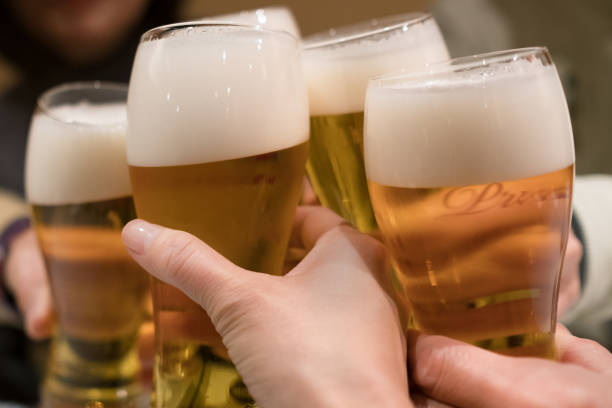Last Updated on May 17, 2023

Humans have debated the benefits and drawbacks of fermented beverages for the longest time and that debate continues to rage today.
Alcohol is both a tonic and a toxin, it’s safe to say. The main difference is in the dose. Moderate drinking appears to be beneficial to the heart and circulatory system, as well as possible prevention of type 2 diabetes and gallstones. In most nations, excessive drinking is a leading cause of preventable death.
Drinking heavily can hurt the liver and heart, impair an unborn child, increase the risk of breast and other cancers, contribute to depression and aggression, and disrupt relationships.
It’s not surprising that alcohol has two personalities. The primary element in alcoholic beverages, ethanol, is a simple chemical that has a variety of effects on the body. It affects the stomach, brain, heart, gallbladder, and liver immediately. Ethanol also has an impact on blood lipids (cholesterol and triglycerides), insulin levels, inflammation, and coagulation. It also affects the mood, focus, and coordination of the individual.
What is considered moderate drinking?

It is clear that alcohol needs to be consumed in moderation. Even the adverts would tell you to drink responsibly. However, what does moderation mean when it comes to alcohol consumption? What is enough and what is too much?
For healthy people, moderate alcohol consumption means no more than one drink per day for women and two drinks per day for men.
12 ounces of beer, 5 ounces of wine, or 112 ounces of spirits (hard liquor such as gin or whiskey) are commonly considered one drink. Each has roughly 12 to 14 grams of alcohol on average, although now that higher-alcohol microbrews and wines are being made, there is a wider range.
It’s a delicate balancing act to define moderate drinking. Moderate drinking is defined as a level of consumption where the health benefits of alcohol clearly exceed the hazards.
Negative effects of alcohol

Not everyone who enjoys alcoholic beverages consumes only one. While some people drink in moderation, many do not, and heavy drinking has a negative impact on every system that makes up the body. Let’s take a closer look.
Immune System
This is what protects your body against bacteria, viruses, and other illnesses. The immune system is slowed by alcohol, which causes bacteria-fighting white blood cells to be sluggish and ineffective. Heavy drinkers may be more susceptible to diseases like tuberculosis or pneumonia, as well as an increased risk of cancer.
Reproductive System
Erectile dysfunction is a typical side effect of alcohol misuse in men. Inhibition of hormone production can also lead to infertility. Alcohol can induce menstrual irregularities and infertility in women. It also increases the risk of developing breast cancer. Alcohol consumption during pregnancy increases the chance of a miscarriage or stillbirth.
Circulatory System
A heavy drinker is considerably more likely to have cardiac problems than a non-drinker because even one night of heavy drinking can trigger difficulties for your heart. Females are in even higher danger. Poisoning of the heart muscle cells, an irregular heartbeat, excessive blood pressure, stroke, or heart attack are all possible heart disorders.
Digestive System
This is where major harm can develop swiftly. Our intestines have a hard time controlling bacteria and absorbing nutrients when we drink alcohol, which can contribute to malnutrition. Alcohol has also been linked to damage to the salivary glands, gum disease and tooth decay are two common dental problems. Ulcers in the oesophagus, heartburn and acid reflux, gastritis and stomach ulcers, internal haemorrhage, haemorrhoids.
Central Nervous System
Alcohol alters one’s conduct. It prevents you from speaking, resulting in slurred speech and poor coordination. It impairs impulse control and memory formation, resulting in “blackouts.” Numbness, weakness, and transient paralysis can all be caused by alcohol. Long-term use can cause the brain’s frontal lobes to shrink. Heavy drinking can develop a dependency, which can result in painful withdrawal symptoms.
Excretory System
This system is in charge of eliminating waste materials from the body, such as alcohol. Excessive alcohol intake can cause the pancreas to stop producing insulin and produce poisonous chemicals, which can lead to the organ’s demise. Alcohol abuse can affect the liver, which is responsible for breaking down toxic compounds in the body. This can cause hepatitis, jaundice, and cirrhosis, which is a scarring of the liver that finally kills it. Alcohol can irritate the kidneys, bladder, and prostate.
Read: Dispelling Myths About the Science of Weight Loss
Beneficial effects of alcohol

You’ve heard time and time again how bad drinking alcohol is for your health, weight loss, and attitude. However, several researchers have demonstrated that using alcohol on occasion has certain advantages. And we agree—as long as you keep your drinking in check and sip in moderation, you might just notice some alcohol benefits!
Red wine can actually burn fat
A glass of red wine can be beneficial to your weight-loss efforts. Due to a molecule called ellagic acid, a study from Oregon State University found that the dark red grapes found in some varieties of red wine can help people control obesity and metabolic fatty liver. This chemical inhibits the growth of fat cells and prevents the formation of new ones, resulting in an increase in the metabolism of fatty acids in liver cells.
White wine is weight-loss friendly
Although it appears that red wine gets all of the credit for being healthy, white wine enthusiasts need not worry; prior research has shown that white wine is the better alternative for weight loss. According to studies, the phenols in white wine have a higher antioxidant content than those in red wine. These weight-loss wines are budget-friendly as well as waist-friendly.
Beer can strengthen your bones
According to a study published in the American Journal of Clinical Nutrition, beer’s high silicon content is what causes an increase in bone density. Moderate beer drinkers who consume 1-2 glasses per day are more likely to experience that effect, although women benefit the most. According to the study, postmenopausal women who drank two beers every day increased their bone density by 8.3%! That’s a fantastic reason to go out after work.
Tequila can help you lose weight
According to an American Chemical Society study, the agavins (natural sugar) found in this Mexican liquor are more effective at aiding weight loss than artificial sweeteners. Scientists found that after putting agavins in the water of a group of mice, the mice had lower glucose levels and stayed fuller for longer. So, the next time someone offers you a shot of tequila, take it! But just one at a time.
Read: How Does Oral Health Affect Overall Wellness?
The Bottom Line: Balancing Risks and Benefits
Because of the complexities of alcohol’s effects on the body and the complexities of the people who consume it, blanket alcohol recommendations are impossible to make. Because we all have varied personal and family backgrounds, alcohol has a different range of benefits and risks for each of us. When deciding whether or not to drink alcohol, especially for “medicinal purposes,” it’s important to weigh the benefits and hazards carefully.
Read: How Does Volunteering Positively Impact Your Life?
Before You Go…
Hey, thank you for reading this blog to the end. I hope it was helpful. Let me tell you a little bit about Nicholas Idoko Technologies. We help businesses and companies build an online presence by developing web, mobile, desktop, and blockchain applications.
We also help aspiring software developers and programmers learn the skills they need to have a successful career. Take your first step to becoming a programming boss by joining our Learn To Code academy today!
Be sure to contact us if you need more information or have any questions! We are readily available.











